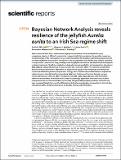Bayesian Network Analysis reveals resilience of the jellyfish Aurelia aurita to an Irish Sea regime shift
Abstract
Robust time-series of direct observations of jellyfish abundance are not available for many ecosystems, leaving it difficult to determine changes in jellyfish abundance, the possible causes (e.g. climate change) or the consequences (e.g. trophic cascades). We sought an indirect ecological route to reconstruct jellyfish abundance in the Irish Sea: since zooplankton are jellyfish prey, historic variability in zooplankton communities may provide proxies for jellyfish abundance. We determined the Bayesian ecological network of jellyfish–zooplankton dependencies using jellyfish- and zooplankton-abundance data obtained using nets during a 2-week cruise to the Irish Sea in 2008. This network revealed that Aurelia aurita abundance was dependent on zooplankton groups Warm Temperate and Temperate Oceanic as defined by previous zooplankton ecology work. We then determined historic zooplankton networks across the Irish Sea from abundance data from Continuous Plankton Recorder surveys conducted between 1970 and 2000. Transposing the 2008 spatial dependencies onto the historic networks revealed that Aurelia abundance was more strongly dependent over time on sea surface temperature than on the zooplankton community. The generalist predatory abilities of Aurelia may have insulated this jellyfish over the 1985 regime shift when zooplankton composition in the Irish Sea changed abruptly, and also help explain its globally widespread distribution.
Citation
Mitchell , E G , Wallace , M I , Smith , V A , Wiesenthal , A A & Brierley , A S 2021 , ' Bayesian Network Analysis reveals resilience of the jellyfish Aurelia aurita to an Irish Sea regime shift ' , Scientific Reports , vol. 11 , no. 1 , 3707 . https://doi.org/10.1038/s41598-021-82825-w
Publication
Scientific Reports
Status
Peer reviewed
ISSN
2045-2322Type
Journal article
Description
This study and the sampling at sea was funded by a grant from the UK Natural Environment Research Council (NE/E010350/1) to ASB and VAS. EGM was funded by a NERC grant (NE/P002412/1) and Independent Research Fellowship (NE/S014756/1).Collections
Items in the St Andrews Research Repository are protected by copyright, with all rights reserved, unless otherwise indicated.

